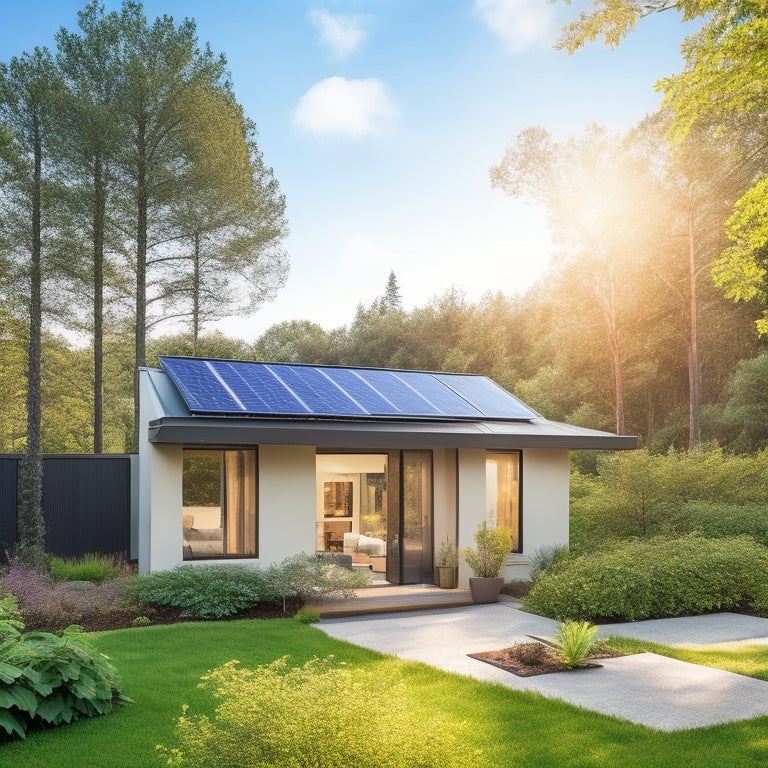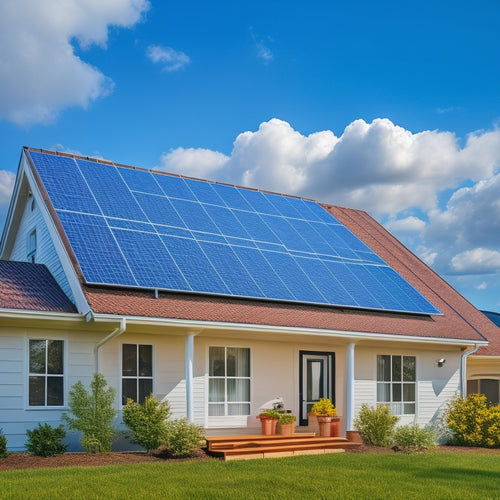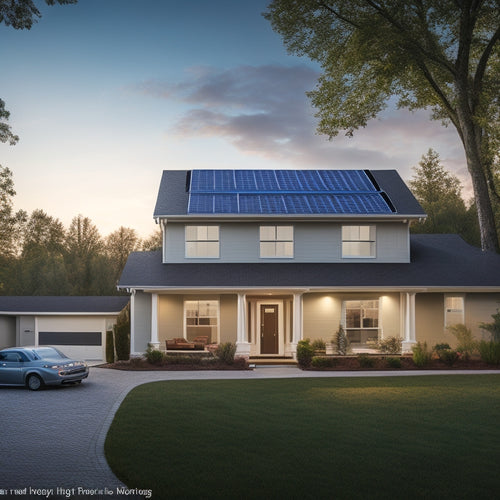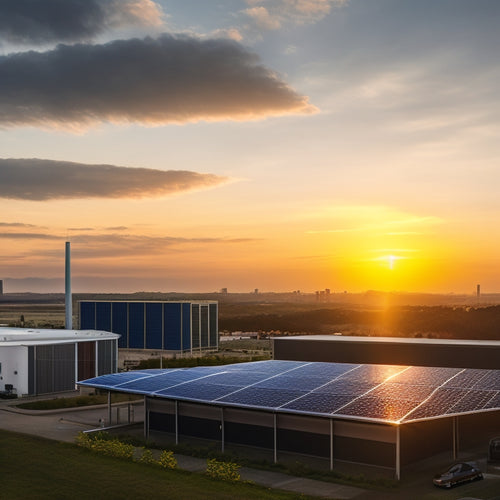
5 Best Home Energy System Cost Savings
Share
By investing in a home energy system, you can gain significant cost savings, with the average American household potentially reducing their energy bills by up to 50% annually. To maximize these savings, consider reducing upfront solar panel costs through alternative financing options and bulk purchases. You can also claim federal solar tax credits and state incentives to further reduce your expenses. Additionally, optimizing energy storage and minimizing roofing and installation fees can lead to substantial long-term savings. By prioritizing energy efficiency and proactive maintenance, you'll be well on your way to enjoying a cost-effective and sustainable home energy system - and there's more to investigate when it comes to optimizing your returns.
Overview
- Collaborate with neighbors or community groups to obtain bulk purchase discounts on solar energy systems, leading to significant upfront cost savings.
- Take advantage of federal solar tax credits, such as the Solar Investment Tax Credit (ITC), to claim up to 26% of total system cost on federal income taxes.
- Invest in energy-efficient solutions, such as smart home automation and energy-efficient appliances, to optimize energy usage and reduce energy storage costs.
- Negotiate better rates with contractors during off-seasons to minimize roofing and installation fees, and select durable roofing materials to reduce long-term replacement costs.
- Implement a proactive maintenance approach, including regular inspections and upkeep, to extend system lifespan, reduce costs, and avoid costly repairs.
Reducing Upfront Solar Panel Costs
Frequently, homeowners considering solar energy systems are deterred by the high upfront costs of solar panels. However, you can overcome this hurdle by exploring alternative financing options.
It's crucial to evaluate energy needs to determine the required system size and adjust daily habits to reduce energy usage and enhance solar panel efficiency.
Solar panel financing, for instance, allows you to install a system with little to no upfront costs. You can opt for a loan or a power purchase agreement, which enables you to pay for the energy generated by the system rather than the system itself.
Additionally, you can take advantage of bulk purchase discounts by pooling your resources with neighbors or local community groups. By doing so, you can negotiate better prices with suppliers and reduce your upfront expenses.
Maximizing Federal Solar Tax Credits
Your investment in a solar energy system can pay off in more ways than one, including a significant reduction in your tax liability.
As a homeowner, you're eligible for the Solar Investment Tax Credit (ITC), which allows you to claim a credit of 26% of the total cost of your solar energy system.
In addition to the ITC, you may also benefit from Federal and State Incentives such as the Federal Investment Tax Credit (ITC) for battery storage, which offers up to 30% of total battery storage costs.
This credit can be claimed on your federal income taxes, providing substantial savings. Additionally, you may be eligible for state incentives, which can further reduce your tax burden.
When considering solar financing options, be sure to factor in the potential tax savings to maximize your return on investment.
Lowering Home Energy Storage Expenses
By reducing your reliance on the grid, you can also lower your energy storage expenses. This is especially true when you invest in energy-efficient solutions that optimize your energy usage. Advances in battery technology have made it possible to store excess energy generated by your solar panels during the day for use at night or during power outages.
| Energy Efficiency Measures | Potential Savings |
|---|---|
| Smart Home Automation | 10-15% |
| Energy-Efficient Appliances | 8-12% |
| LED Lighting | 5-8% |
| Insulation Upgrades | 12-18% |
| Energy Monitoring Systems | 15-20% |
Minimizing Roofing and Installation Fees
The cost of installing a home energy system can add up quickly, but there are ways to minimize roofing and installation fees without sacrificing quality or performance.
You can start by selecting the right roofing material for your system. For instance, choosing a durable and long-lasting material can reduce replacement costs in the long run.
Moreover, optimizing your installation timeline can also help reduce fees. By scheduling the installation during the off-season or during periods of low demand, you can negotiate better rates with contractors.
In addition, considering high-efficiency solar charging solutions advanced MPPT technology that maximize energy harvest can also lead to long-term cost savings.
Similarly, evaluating energy storage types and battery capacity to determine the right fit for your energy needs can help reduce unnecessary expenses.
Optimizing Long-Term Maintenance Savings
Maintaining a home energy system requires a proactive approach to optimize long-term maintenance savings. You can achieve this by focusing on energy efficiency and performing regular inspections to identify potential issues before they become major problems. This approach will help you avoid costly repairs, reduce downtime, and extend the lifespan of your system.
| Maintenance Tasks | Frequency |
|---|---|
| Inspect and clean panels | Quarterly |
| Check inverter performance | Bi-annually |
| Perform system diagnostics | Annually |
Frequently Asked Questions
How Do I Determine My Home's Energy Efficiency Rating?
You can determine your home's energy efficiency rating by conducting an energy audit, which identifies areas for improvement, then implementing efficiency upgrades, such as insulation and window replacements, to increase your rating and reduce energy consumption.
Can I Install Solar Panels on a Rented Property?
You're charting a course through unexplored waters, seeking freedom from energy bills. But, before anchoring solar panels on a rented property, traverse solar panel regulations and investigate renter energy options, ensuring a harmonious voyage with your landlord.
Are Energy Storage Systems Compatible With Existing Grid Connections?
You're wondering if energy storage systems are compatible with existing grid connections. Luckily, most modern systems are designed for seamless grid integration, ensuring smooth battery compatibility and efficient energy flow, giving you the freedom to store and use energy as you see fit.
Do Energy-Efficient Appliances Require Special Maintenance?
Did you know 30% of a home's energy is wasted due to inefficient appliances? You won't need special maintenance for energy-efficient appliances, but following energy saving tips can extend their lifespan, giving you more freedom to enjoy your savings.
Can I Sell Excess Energy Back to the Grid?
You can sell excess energy back to the grid through net metering benefits, which allow you to generate your own power and export any surplus to the grid, earning credits through energy buyback programs that offset your energy bills.
Ready to Buy
As you initiate your expedition to utilize the power of the sun, remember that every dollar saved is a step closer to energy independence. By reducing upfront solar panel costs, maximizing federal solar tax credits, lowering home energy storage expenses, minimizing roofing and installation fees, and optimizing long-term maintenance savings, you'll be utilizing not only the sun's energy but also the power of smart financial planning. And as the saying goes, "a penny saved is a penny earned" - in this case, a penny saved is a kilowatt-hour generated.
Related Posts
-

Cost of Solar Panel Installation
You can expect to pay between $15,000 and $30,000 or more for a typical solar panel installation, depending on the sy...
-

Cost of Solar With Battery Backup
You're investing in a solar panel system with battery backup to guarantee reliable power during outages. The cost of ...
-

Advantages of Commercial Solar Battery On-Site Storage
By investing in a commercial solar battery on-site storage system, you can greatly reduce your energy grid dependence...


